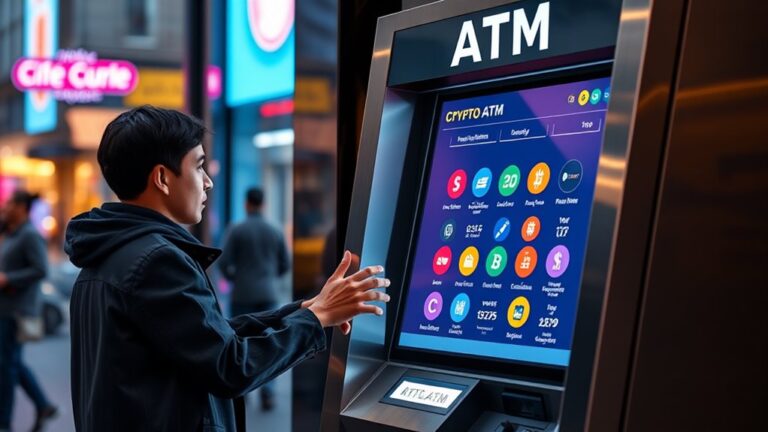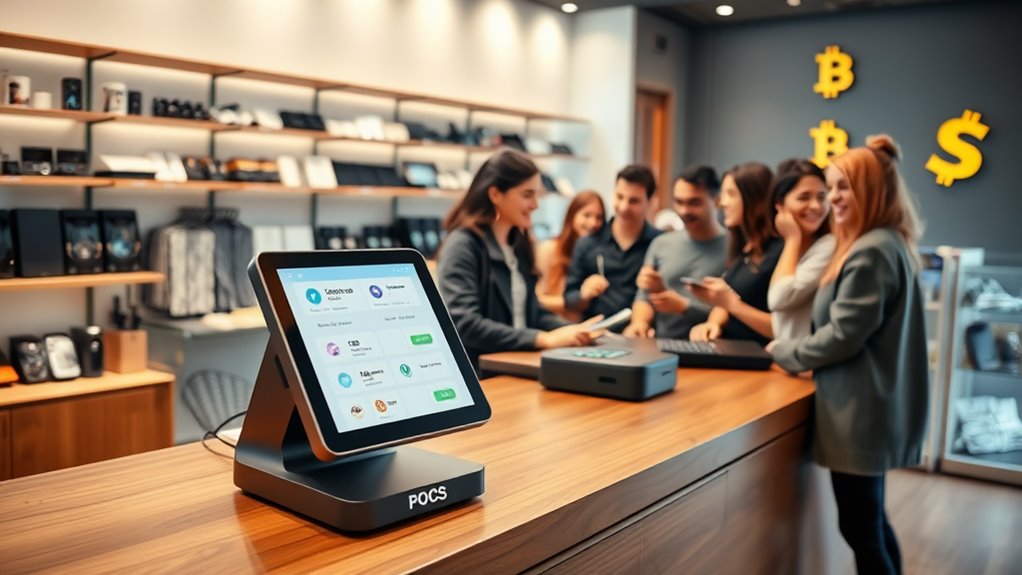
Crypto Pos Systems: How They Work and Their Benefits
Crypto POS systems allow businesses to accept cryptocurrency payments efficiently, similar to traditional point-of-sale systems. These systems utilize technology like QR codes to facilitate quick transactions and provide real-time crypto-to-fiat conversion. Benefits for retailers include lower transaction fees, enhanced security through blockchain, and the ability to attract a tech-savvy customer base. Additionally, they support various cryptocurrencies and integrate easily with existing payment setups. Understanding these systems reveals how they can transform retail transactions.
Key Takeaways
- Crypto POS systems enable seamless cryptocurrency transactions through QR codes and digital wallets, similar to traditional payment systems.
- They provide lower transaction fees and improved operational efficiency, enhancing customer experience and potentially increasing revenue for businesses.
- Security features include encryption and blockchain technology, ensuring transparent and immutable transaction records, reducing chargeback risks.
- Integration capabilities with existing POS systems allow for multi-currency support and real-time reporting, facilitating effective transaction management.
- The rise of Central Bank Digital Currencies (CBDCs) may enhance the legitimacy and acceptance of crypto POS systems in mainstream retail.
Understanding Crypto POS Systems
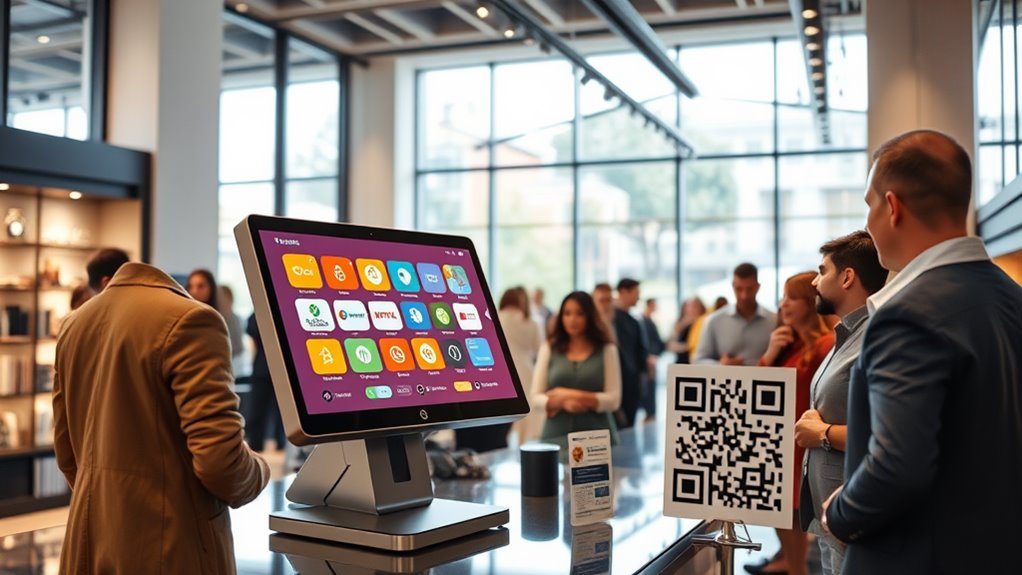
How do cryptocurrency point-of-sale (POS) systems operate within the modern payment landscape?
These systems integrate into existing payment infrastructures, utilizing decentralized blockchain networks to process transactions. They facilitate instant or near-instant payments by converting cryptocurrencies, such as Bitcoin, into fiat currencies.
Businesses adopt crypto POS systems to broaden payment options and attract tech-savvy customers. Understanding transaction fees is essential, as these fees are often lower than those of traditional methods.
Businesses leverage crypto POS systems to expand payment choices and engage a tech-savvy clientele, benefiting from lower transaction fees.
Additionally, the transparency and immutability of blockchain enhance security, reducing the risks of fraud. Crypto POS systems typically require devices like phones or terminals and use technologies like QR codes for convenient transactions. This integration helps automate financial tracking, improving operational efficiency for businesses. Furthermore, crypto payment gateways provide a seamless solution for processing these transactions, ensuring that merchants can accept digital currencies effortlessly.
Types of Crypto POS Systems

The landscape of cryptocurrency point-of-sale (POS) systems is diverse, with various types tailored to meet the needs of different businesses.
Mobile and tablet-based systems offer portability and cost-effectiveness, utilizing smartphone apps for transactions, though they may have limited functionality.
Conversely, desktop or terminal-based systems provide robustness and advanced features, making them suitable for high-use environments but often at a higher cost and fixed location.
Online crypto POS systems integrate easily with e-commerce platforms, allowing global transactions and real-time payments.
Dedicated crypto POS devices enhance security and connectivity but typically involve greater expenses.
Finally, specialized crypto POS solutions support multiple currencies and offer features for tax compliance and volatility management, catering to specific business requirements.
Benefits for Businesses

Businesses can significantly benefit from adopting cryptocurrency point-of-sale (POS) systems, which offer a range of operational, financial, market expansion, technological, and strategic advantages.
These systems enhance customer experience by providing multiple payment options, catering to tech-savvy consumers. Operational efficiency is improved through automated accounting and real-time transaction processing, leading to faster cash flow.
Financially, lower transaction fees and diversified payment options can increase revenue. Market expansion is facilitated by global accessibility to customers, while technological benefits include innovative solutions that support digital transformation.
Strategically, early adoption positions businesses ahead of competitors and enhances their reputation as forward-thinking. Additionally, companies like AT&T and Microsoft demonstrate how integrating crypto payments can boost customer engagement and satisfaction. Overall, cryptocurrency POS systems present a thorough solution for modern business needs.
Security and Transparency Features

Security and transparency are essential features of crypto POS systems, primarily due to their reliance on blockchain technology.
The use of encryption methods safeguards payment data, while the decentralized nature of blockchain eliminates single points of failure, enhancing overall security.
Additionally, the immutable ledger guarantees that all transactions are recorded transparently, allowing for easy tracking and accountability. Furthermore, blockchain technology offers faster payment processing, making crypto POS systems a more efficient option for merchants and consumers alike.
Blockchain Security Benefits
While exploring the advantages of blockchain technology, it becomes evident that its security and transparency features play an essential role in enhancing trust within digital transactions. The decentralized nature of blockchain minimizes vulnerabilities, while consensus mechanisms like Proof of Work guarantee transaction integrity. Immutable records make it difficult for fraud to occur, and real-time verification increases accountability. Furthermore, the use of decentralized, immutable digital ledgers ensures that all participants have access to the same data, further strengthening the transparency of transactions.
| Security Feature | Benefit |
|---|---|
| Decentralized Nature | Reduces single points of failure |
| Immutable Records | Prevents tampering and fraud |
| Verifiable Transactions | Enhances transparency and trust |
| Robust Access Control | Protects against unauthorized access |
These characteristics collectively contribute to a more secure and reliable environment for conducting digital transactions, making blockchain an appealing option for businesses.
Encryption Methods Overview
Encryption methods play an essential role in guaranteeing the security and transparency of transactions within Point of Sale (PoS) systems. Various algorithms are utilized, including symmetric and asymmetric encryption.
Symmetric algorithms, like AES, offer speed but generally provide lower security, as they use one key for both encryption and decryption. In contrast, asymmetric algorithms, such as RSA, utilize a pair of keys, enhancing security at a slower pace.
Additionally, hash functions create unique data fingerprints that guarantee integrity without needing decryption. Techniques like Point-to-Point Encryption (P2PE) and tokenization further secure sensitive information.
Integration and Compatibility
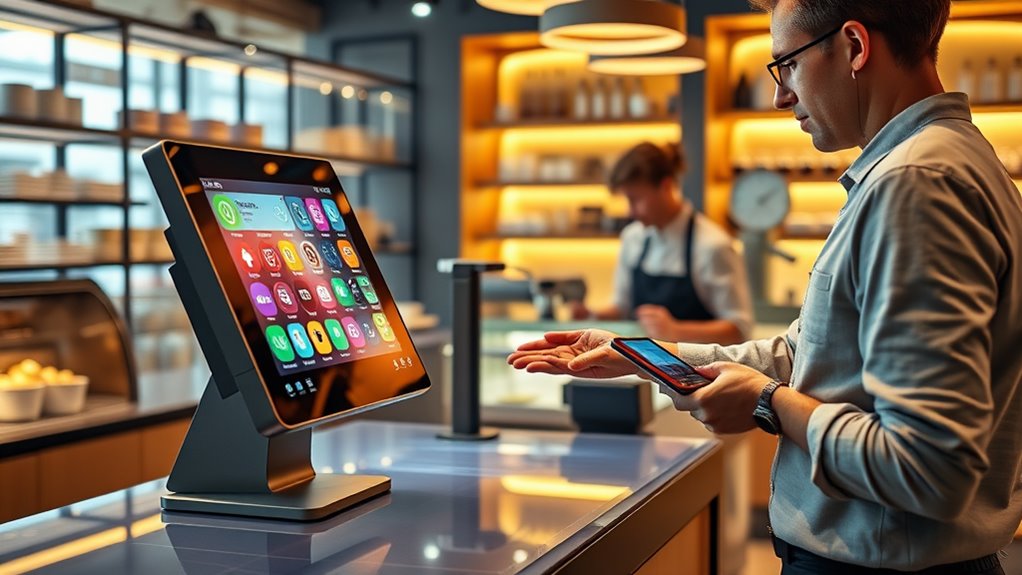
Integration and compatibility are critical aspects of implementing cryptocurrency point-of-sale (POS) systems, as they determine how well these systems function within existing business frameworks.
Mobile and desktop integrations allow merchants to accept cryptocurrency payments seamlessly across various devices, while dedicated hardware offers reliable transaction security. Many systems utilize QR codes for easy payment processing and support API integration, enhancing compatibility with traditional and online POS setups.
Additionally, these systems often convert cryptocurrency to fiat currency to reduce volatility risks. With multi-currency support and real-time reporting features, businesses can manage transactions effectively.
Market and Industry Impact
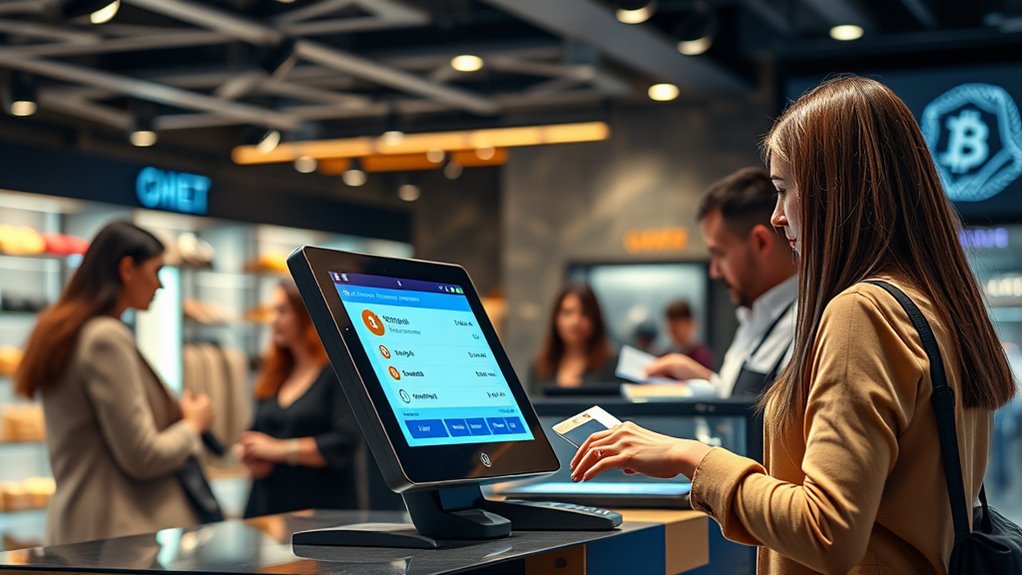
The implementation of cryptocurrency point-of-sale (POS) systems is reshaping the market and industry landscape. This shift is marked by significant growth and evolving consumer behaviors, influencing how businesses operate.
The rise of cryptocurrency POS systems is transforming business operations and consumer interactions in the market.
Key trends include:
- The global cryptocurrency payment apps market is projected to grow from USD 545.4 million in 2021 to USD 2.15 billion by 2030.
- North America accounted for over 32% of global revenue in 2021.
- The Asia Pacific region is expected to experience rapid growth due to technological advancements.
- Crypto POS systems attract cryptocurrency enthusiasts, potentially boosting sales.
- Lower transaction fees and enhanced security through blockchain technology benefit retailers.
Moreover, the emergence of CBDCs is expected to further drive the adoption of crypto POS systems as they create a more stable environment for digital transactions.
Frequently Asked Questions
How Do I Choose the Right Crypto POS System for My Business?
Choosing the right crypto POS system involves evaluating business needs, considering transaction fees, compatibility with existing tools, supported cryptocurrencies, and analyzing security features to guarantee a seamless and efficient payment process for customers.
Are Crypto POS Systems Compatible With All Cryptocurrencies?
Not all crypto POS systems are compatible with every cryptocurrency. While many support major currencies, some are limited to specific blockchains. Understanding these limitations is essential for businesses looking to optimize their payment solutions.
What Are the Tax Implications of Using a Crypto POS System?
The tax implications of using a crypto POS system include capital gains tax on profits, income tax on earnings, and the need for meticulous transaction recording to comply with evolving local and international regulations.
Can I Use a Crypto POS System in a Cash-Only Business?
In a world where cash ruled supreme, a cash-only business could indeed adopt a crypto POS system. This shift not only broadens payment options but also attracts a modern clientele, enhancing overall operational efficiency.
How Do I Handle Refunds With a Crypto POS System?
Handling refunds with a crypto POS system involves initiating the process, selecting the transaction, and providing the refund amount. Merchants can issue full or partial refunds, with security measures ensuring customer data protection throughout.
Conclusion
To summarize, crypto POS systems represent a significant advancement in payment technology, offering businesses various benefits such as reduced transaction fees and enhanced security. While some skeptics question their reliability, the increasing adoption of these systems suggests a growing trust in their capabilities. As more companies integrate crypto payments, the potential for widespread acceptance appears promising. Ultimately, the evolution of payment methods continues to reshape the market, highlighting the importance of staying informed about emerging technologies.





